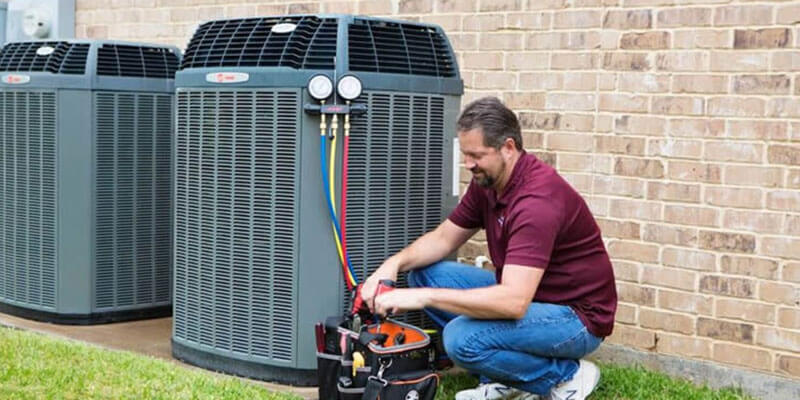Air conditioning has become an indispensable part of our lives, providing respite from the scorching heat in summer and maintaining a cozy environment during chilly winters. However, air conditioners are prone to malfunctions and breakdowns like any other mechanical system. When your AC starts acting up, it’s crucial to address the issues promptly to restore comfort and prevent further damage. This article explore the importance of air conditioning repair, signs that indicate your system needs attention, troubleshooting tips, the benefits of hiring professionals, common repair services, preventive maintenance, cost considerations, energy efficiency, and more.
Signs that your air conditioning system needs repair
- Insufficient cooling or heating: If your AC fails to cool or heat your space adequately, it may indicate a problem with the compressor, refrigerant levels, or airflow.
- Frequent on/off cycling: Rapid cycling can strain the system, resulting in energy inefficiency and potential damage to components. This issue may stem from a faulty thermostat, improper sizing, or a clogged air filter.
- Strange noises or odors: Unusual sounds like grinding, squealing, or rattling, as well as foul smells, can be indicative of worn-out parts, loose components, or mold growth within the system.
- Poor airflow: Weak airflow from the vents can be a sign of a blocked air filter, clogged ductwork, or malfunctioning fan motor.
DIY troubleshooting tips
Before calling in a professional, you can try a few troubleshooting steps to resolve minor issues potentially:
- Checking the thermostat settings: Ensure that the thermostat is set to the desired temperature and operating mode (cool, heat, or fan).
- Cleaning or replacing air filters: Dirty filters restrict airflow, leading to reduced cooling or heating efficiency. Regularly clean or replace filters as recommended by the manufacturer.
- Clearing debris around the outdoor unit: Remove leaves, dirt, and other debris from the outdoor unit to maintain proper airflow.
- Verifying power supply: Check if the AC unit receives power by ensuring that the circuit breaker hasn’t tripped and the electrical connections are secure.
Hiring a professional air conditioning repair service
While DIY troubleshooting can be helpful, knowing when to seek professional assistance is essential. Hiring a reputable air conditioning repair service offers several advantages:
- Professional expertise: Trained technicians have the knowledge and experience to diagnose and repair complex issues accurately.
- Finding a reliable repair service: Ask for recommendations from friends, family, or neighbors, and read online reviews to find a reputable and trustworthy repair service.
- Checking licenses and certifications: Ensure that the repair service holds the necessary licenses and certifications to operate legally and provide quality services.
- Requesting cost estimates: Obtain detailed cost estimates from multiple repair services to compare pricing and understand the scope of the repairs required.
Common air conditioning repair services
Professional technicians can address various air conditioning issues. Some common repair services include:
- Refrigerant leak detection and recharge: Low refrigerant levels can impair cooling performance. Technicians identify and repair leaks before recharging the system.
- Compressor replacement or repair: The compressor is a vital component that can fail due to electrical issues or mechanical faults. Repairing or replacing the compressor can restore proper functioning.
- Fan motor replacement: Faulty fan motors can cause inadequate airflow. Technicians can replace them to improve the air circulation within the system.
- Ductwork inspection and repair: Leaky or damaged ducts can lead to reduced efficiency and uneven cooling or heating. Professional repair services can inspect and repair ductwork as needed.
Regular maintenance to prevent repairs
Preventive maintenance is crucial to extend the lifespan of your air conditioning system and minimize the need for repairs. Consider the following maintenance tasks:
- Importance of routine maintenance: Regular maintenance by professionals helps identify potential issues early on and ensures optimal performance.
- Cleaning the air conditioning system: Regularly clean the condenser, evaporator, and other system components to remove dust and debris.
- Inspecting and tightening electrical connections: Loose or faulty electrical connections can disrupt the functioning of the system. Technicians can inspect and tighten connections to avoid potential issues.
- Lubricating moving parts: Proper lubrication of motors, fans, and other moving parts reduces friction, minimizes wear and tear, and extends the lifespan of the system.
Cost Considerations for air conditioning repair
Several factors influence the cost of air conditioning repairs. These include the complexity of the problem, the need for replacement parts, labor costs, and the service provider’s pricing structure. It’s crucial to understand the following aspects:
- Factors influencing repair costs: Repair costs can vary based on the specific problem, the age and condition of the system, and the availability of replacement parts.
- Pricing structures of repair services: Some repair services charge a flat rate, while others charge hourly rates. Obtain detailed cost estimates to understand the breakdown of expenses.
- Understanding warranties and guarantees: Inquire about warranties or guarantees offered by the repair service to ensure protection against recurring issues and faulty repairs.
Energy efficiency and air conditioning repair
Repairing your air conditioning system restores comfort and enhances energy efficiency. Consider the following aspects:
- Impact of repairs on energy efficiency: Addressing issues like refrigerant leaks, malfunctioning components, or clogged filters improves the system’s efficiency and reduces energy consumption.
- Upgrading to a more efficient system: If your current AC is outdated and inefficient, repairing it may only offer temporary relief. Consider upgrading to a more energy-efficient model for long-term savings.
- Programmable thermostats and intelligent controls: Installing programmable thermostats and smart controls allows you to optimize cooling and heating schedules, reducing energy usage.
Timely air conditioning repair is crucial to maintain optimal comfort and efficiency. Whether it’s addressing minor issues through DIY troubleshooting or seeking professional assistance, taking proactive steps can extend the lifespan of your system and prevent costly breakdowns. Regular maintenance, cost considerations, and energy efficiency also play significant roles in ensuring the longevity and performance of your air conditioning system.
FAQs
-
How often should I have my air conditioning system inspected?
- It’s recommended to have your AC system inspected by professionals at least once a year, preferably before the start of the cooling season.
-
Can I repair my air conditioning system myself?
- While some minor issues can be resolved through DIY troubleshooting, it’s generally recommended to leave complex repairs to trained professionals to avoid further damage.
-
How long does an air conditioning repair typically take?
- The duration of an air conditioning repair can vary depending on the issue’s complexity. Minor repairs may take a few hours, while major repairs might span over a day or more.
-
What should I do if my air conditioning system is leaking water?
- If your AC system leaks water, it may indicate a clogged condensate drain or a refrigerant leak. Contact a professional air conditioning repair service to diagnose and resolve the issue.
-
Are there any DIY maintenance tasks I can perform to avoid repairs?
- Yes, you can perform tasks like regularly cleaning or replacing air filters, keeping the outdoor unit clear of debris, and ensuring proper airflow around the system to minimize the need for repairs.










More Stories